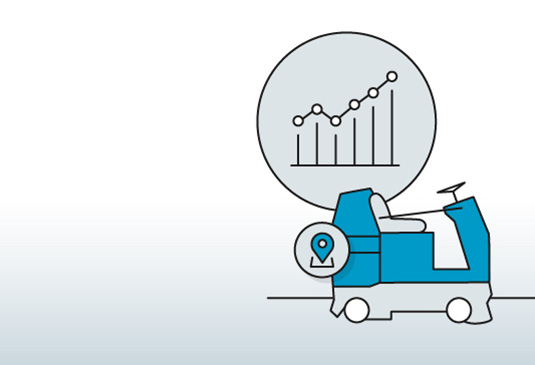Your shopping cart is empty.
How to Implement and Utilize Data-Driven Decisions
Posted in Industry News & Trends,

If you think that data can't be used to make smarter cleaning decisions, you're thinking wrong. Data driven decisions are used across all industries to change the way businesses operate for the better - ideally enhancing efficiency and productivity while reducing operating costs. The floor care industry is no exception, and cleaning equipment is becoming continuously smarter and more connected - largely due to its integration with the Internet of Things (IoT).
In this post, we'll take a closer look at the importance of making data driven decisions in cleaning, and how it can help take your efforts to a new level and attain a competitive advantage over your competition. Here's a look:
What is IoT?
Let's start by talking about what IoT is. Short for "Internet of Things," it refers to physical objects or equipment - like cleaning equipment - that is enhanced with the likes of sensors, software and other technologies to make them work smarter. These enhancements exchange data with other systems using the internet to learn from each other and essentially do things better.
Some simple examples of IoT devices include smart TVs, smart thermostats, smartwatches and other wearables, doorbell cameras, and more. Cleaning equipment has also become much smarter over the years. Perhaps the best mainstream example of this is the robot household vacuum cleaner. However, commercial cleaning equipment, like scrubbers and cleaners, has also become smarter. Combined with asset management software, cleaners are now able to increase productivity while reducing overhead costs and making better overall decisions.
Benefits of data collection in cleaning business
Embracing data collection in a cleaning business is a low-risk, high-reward endeavor. Doing so allows cleaners to make data driven decisions on identifying opportunities, driving proper equipment usage and optimizing overall performance. It also allows cleaners to monitor their equipment more carefully so they can identify any underperforming machines sooner and have them addressed faster.
Some other benefits associated with data collection in a cleaning business include:
- Track equipment: Smart equipment has somewhat of a built-in lock-out/tag-out process, so you can monitor where your fleet is and take note of any irregularities based on their location.
- Remote operation: Some equipment is even able to be controlled remotely, similar to the robot home vacuum example that we shared in the opening. Such machines can be programmed to clean certain areas at certain times without a person manually operating them. This can streamline efficiency and reduce workforce needs.
- Energy savings: This is another potential benefit as IoT machines can optimize energy usage and battery charging to reduce power consumption. Not only does this help reduce energy costs, but it can also become a talking point for cleaning companies that have established sustainability programs, which more consumers are taking note of.
All told, the benefits of making data driven decisions can all help boost cleaning productivity, efficiency and overall quality.
Perhaps the biggest challenge involved in such an implementation plan is getting employee buy-in and training the workforce on how to use these programs to their maximum potential. But as cleaning companies soon learn after implementing strategies, the benefits far outweigh any learning curve or shift in business operations.
Contact us today
For more information on the benefits of and how to implement and utilize data driven decisions for cleaning, contact us today.
RELATED LINKS
Ready to take your cleaning to the next level?
Whether you are requesting a product demonstration or a quote, ordering parts, or making a service appointment, you've come to the right place. Tennant professional representatives are ready with answers to your questions, and we look forward to showing you how much we appreciate your business.


